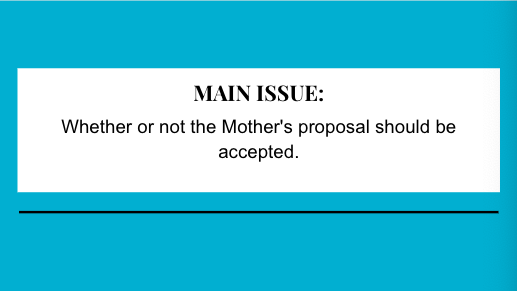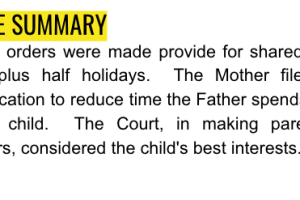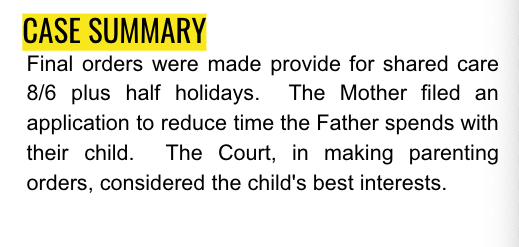- · 4752 friends
Mother Proposes Reduced Time of the Father with Child

Leighton & Bainum [2022] FedCFamC2F 1615 (24 November 2022)
Final orders were made provide for shared care 8/6 plus half holidays. The Mother filed an application to reduce time the Father spends with their child. The Court, in making parenting orders, considered the child's best interests.

Facts
The parties commenced cohabitation in 2009 in the Town C area. Town C is a regional city of about 77,000 people. Compared to the state capitals where the bulk of the Australian population lives that is a small city or, if compared to country areas and country towns, a large regional centre or city. The Father has lived all his life in that area and his family live in that area. The Mother moved to Town C in approximately 2002.
The existing 2020 Final Orders provide for both parenting and property orders. The parenting aspect provides for the parties to have equal shared parental responsibility for the child, for the child to live with the Mother and, in a two week cycle, to spend five nights per fortnight with the Father from Thursday to Monday in one week and Thursday to Friday in the other week as well as one weeknight for dinner. The Final Orders further provided that commencing in term 2 2021, the child spend time with the Father from Thursday to Monday morning in week one, and Wednesday to Friday in week two. There are further provisions for the child to spend relatively equal time with the parents on special occasions and for half of school holidays.
The Mother’s proposal is to relocate with the child to the Town F region in mid-December 2022 and as a consequence, change the child’s school and the current shared care arrangement. The Mother sought an order for equal shared parental responsibility. The Mother entered into a contract of sale for the former matrimonial home which she retained from the parties’ property settlement in September 2022. She proposed to relocate to Town F, approximately 1 hour and 40 minutes from Town C North where the Father resides, and for the child to spend time with the Father from 5pm each alternate Friday until 4pm each Sunday, as well as after school each Wednesday until 6.30PM, as well as two weeks (not half) in the terms 1 and 3 school holidays and on a week about basis for the long summer holidays.
The Mother’s case is that the child has a meaningful relationship with the Father and that her proposal would ensure that meaningful relationship continues, albeit for a shorter period of time. The Mother asserted that the Father contributed half of some of the child’s expenses but did not pay periodic child support due to a low taxable income in his self-employment and that she was responsible for the bulk of the child’s expenses. The Father sought the continuation of an order for equal shared parental responsibility. In final address it was conceded that if the Mother’s application was not successful, as a consequence of the time the Father sought with the child and the place of the child’s school, where it was not contemplated by either parent that the Mother would move without the child or fail to follow court orders, that the effect of the orders sought by the Father was that the Mother would be compelled to live in the Town C area or at least within a practical, for the child, travel distance from the child’s existing school.

Issue
Whether or not the Mother's proposal should be accepted.

Applicable law
Evidence Act 1995 (Cth), s 140 - provides that in a civil proceeding, the court must find the case of a party proved if it is satisfied that the case has been proved on the balance of probabilities.
AMS v AIF (1999) 199 CLR 160 - provides that while the children's interests are paramount, their interests are not the sole determinant of parenting orders under Part VII of the Act.
Analysis
Both parents have taken every opportunity to participate in making decisions about major long-term issues in relation to the child to spend time with the child and to communicate with the child. This is so notwithstanding the allegation of the Father has at times failed to reply to significant text messages. The child will be distressed if the Mother’s proposal is put into place. But on the Mother’s proposal the child will spent time with her Father each week, two nights, over three days each alternate weekend and time for a meal having been picked up from school each Wednesday. In addition it is likely the Father will continue to phone or text the child daily.
As of the 9 December 2022 the Mother will not have her home but will have about $600,000 (less legal fees of about $50,000) instead. That there would be an impact of the recent floods on the availability of accommodation in Town C was not contested. But the Mother conceded in cross examination that she would, given the approach of the summer holidays where the child lives and will live week about, be able to temporarily stay with her mother and likely find accommodation in the Town C area if she has to. The Mother is a mature and competent person who will with the resources she has marshalled find accommodation in either Town E or Town C as she needs to. In either case she will be able to continue in her current employment.
Conclusion
The parties should have equal shared parental responsibility for the child of the relationship X born in 2013 (the child). The child should live with the mother.









